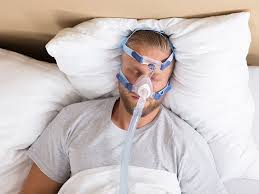
New Delhi. Sleep Apnea: We all know how important sleep is for our health. At least 7-8 hours of sleep is necessary for good health. Along with this, it is also important that there is no disturbance in it. Actually, at this time our body removes the fatigue of the whole day and relaxes. Sleep is also very important for our important organs like heart and brain. But due to lack of sleep or frequent sleep interruptions, there can be many health problems. A serious problem related to sleep is Sleep Apnea, in which the person's breathing stops repeatedly while sleeping.
Due to sleep apnea, the brain wakes up the person so that he can start breathing again. This problem can have very serious consequences, including the risk of heart diseases. How does sleep apnea affect the heart (Sleep Apnea effects on heart) and how can it be managed (Heart Health Tips)? To know the answer to these questions, we spoke to Dr. Bimal Chhajar (former consultant of Emmaus and director of SAAOL Heart Center, New Delhi). Let's know what information he gave about this.
What is sleep apnea?
Sleep Apnea is a sleeping disorder in which a person suddenly stops breathing. This happens only while sleeping, hence it is called sleep apnea. According to the Cleveland Clinic, this happens due to two reasons. The first reason is the windpipe getting blocked and the second reason is the brain's inability to control breathing.
Due to inability to breathe, there is a lack of oxygen in the body and to save life, the person wakes up from sleep, after which he starts breathing again. But this problem starts again when he sleeps. Due to this, one is unable to get a peaceful sleep, which is harmful for health.
Types of sleep apnea
- Obstructive sleep apnea (OSA) - This is the most common type of sleep apnea. In this, the throat muscles relax while sleeping, due to which pressure starts building up on the windpipe. Due to this, breathing gets obstructed and air is not able to reach the lungs.
- Central Sleep Apnea (CSA) - In this, the brain is unable to control breathing properly. It is unable to send signals properly to the important muscles for breathing, due to which the person's breathing stops while sleeping.
- Complex sleep apnea – This is also known as mixed sleep apnea because it is made up of a combination of CSA and OSA.
How does it affect the heart?
Sleep apnea also has a very harmful effect on the heart. Regarding this, Dr. Chhajar explains that obstructive sleep apnea, the most common form of sleep apnea, can cause many heart-related problems. Due to breathing stopping while sleeping, the oxygen level in the body decreases, which puts a lot of pressure on the heart.
This happens because blood pressure starts increasing due to low oxygen levels, which affects the heart. This problem can also lead to chronic hypertension in the future. He further said that sleep apnea also increases the risk of life-threatening conditions like heart arrhythmia or irregular heartbeat, atrial fibrillation, other heart diseases, heart attack and stroke.
Actually, sleep apnea affects normal cardiac functions, which can lead to heart failure or make the condition of people who have this problem more serious. Therefore, patients of sleep apnea need to take special care of their heart. Especially those people who are already suffering from any heart disease must take care.
How to take care of your heart?
Dr. Chhajar says that the risk of heart diseases can be reduced by making some changes in lifestyle.
- Control weight- Obesity is a risk factor for both sleep apnea and heart disease. Therefore, it is very important to have the right weight. In such a situation, by exercising and improving the diet, weight can be controlled and the heart can be kept healthy.
- Eat a balanced diet- Include fruits, vegetables, whole grains, lean proteins and healthy fats in your diet. This will help maintain heart health and also keep weight under control. Also, avoid junk and processed foods. They can increase cholesterol, which is harmful for the heart.
- Avoid smoking and drinking- Smoking and drinking alcohol can worsen the problem of sleep apnea. Also, they increase the risk of heart disease. So avoid both of these.
- Control diabetes- If you are a diabetic patient or prediabetic, try to control the blood sugar level. Increased blood sugar also causes damage to the heart. Also, it can increase inflammation in the body, which is harmful for the blood arteries.
- Exercise- Exercise reduces cholesterol, strengthens lungs and controls weight. Therefore, exercise for at least 30 minutes every day.
How to manage sleep apnea?
- Continuous Positive Airway Pressure (CPAP) is the most effective treatment for sleep apnea. It keeps a person's airway open while sleeping, which prevents breathing difficulties and reduces the frequency of breathing stops and helps maintain proper oxygen levels.
- Do not take sedatives or sleeping pills. These relax the throat muscles, which can worsen sleep apnea.
- Try to reduce the problem of allergies or nasal congestion so that there is no difficulty in breathing. For this, use medicines, nasal spray and humidifier.
- Use dental devices, which help to maintain the correct position of the jaw and teeth so that breathing is not obstructed. These are effective in managing mild sleep apnea.
--Advertisement--

 Priya
Priya Share
Share



